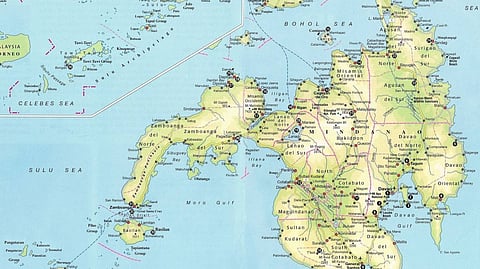
- NEWS
- the EDIT
- COMMENTARY
- BUSINESS
- LIFE
- SHOW
- ACTION
- GLOBAL GOALS
- SNAPS
- DYARYO TIRADA
- MORE

The Mindanao and Sulu Unification Movement (MSUM) reminded President-elect Donald Trump on Saturday about the relevance of the American Monroe Doctrine in relation to the breach of the 1914 Carpenter-Kiram Treaty and the move to take control of the Panama Canal, Canada, and Greenland.
Abraham Idjirani, spokesperson for the MSUM, told the Daily Tribune that Trump’s recent declaration to take over the Panama Canal, Canada, and Greenland clearly indicates that his administration is being guided by the Monroe Doctrine. He argued that this would also cover Mindanao and Sulu, which the United States abandoned as a protectorate despite the live and standing Carpenter-Kiram Treaty.
He explained that the Monroe Doctrine, introduced by the late U.S. President James Monroe in 1823, became the foundation of American foreign policy and solidified American identity on the global stage.
“Since President elect Trump is taking about Panama, Canada and Greenland then he must revisit the Carpenter Kiram treaty to rectify historical error and help solidify US presence in the Southeast Asia’ he said
“Since President-elect Trump is talking about Panama, Canada, and Greenland, he must revisit the Carpenter-Kiram Treaty to rectify historical errors and help solidify U.S. presence in Southeast Asia,” Idjirani said.
He added that the U.S. had practically abandoned the Monroe Doctrine when both the U.S. and Britain compelled Sultan Jamalul Kiram II to relinquish his temporal sovereignty to the United States by signing the 1915 Kiram-Carpenter Agreement.
Idjirani also noted that the 1914 British Inducement Act was issued after the U.S. Congress passed and approved the Jones Law of 1914, which promised Philippine independence and threatened British interests in Sabah.
Through the British Crown Inducement Act, the status of Sabah—already muddled by Spain and the U.S. when they refused to address its rightful owner during the 1898 Treaty of Paris discussions in Paris, France—was further aggravated as a leased territory. The Act also transgressed the perpetual rights, sovereignty, and proprietary power of the Sultan of Sulu and the Bangsa Suluk people.
Sabah was acquired by the Sultan of Sulu and became part of the ancestral domain of the Sultanate of Sulu and North Borneo, or the Bangsa Suluk, through kinship and cession, with sovereignty rights vested by the Sultan of Brunei in 1704.
In doing so, the British Crown sought to avert the possibility of Sabah being incorporated into the Philippine national baseline territory. The U.S. submission to the wishes of the British Crown clearly paved the political path for the British Government to supervise and implement its colonial control over Sabah. The U.S. also abandoned its recognition, as articulated in the Kiram-Bates Treaty of 1899 and reiterated in the 1915 Kiram-Carpenter Agreement, that Sabah was wholly understood to be under lease with the British North Borneo Company.
Anchored on that historic account, the last American Governor-General Harrison called the British Act "political aggression". The MSUM regarded it as an act designed to limit, infringe upon, and break the active terms of the sacred promise and commitment of the U.S. Government, which declared that the termination of the temporal sovereignty of the Sultanate of Sulu and North Borneo, or the Bangsa Suluk Nation, over its dominions and dependencies in the Sulu Archipelago did not signify the end of its continued ecclesiastical authority, jurisdiction, and rights of sovereignty over Sabah.
The legal outcome resulting from the 1914 British Inducement Act and the U.S. yielding to the said Act, despite the mandate of the American Monroe Doctrine of 1885 that guided and defined U.S. foreign policy, led to the British violation and dishonoring of the conditions stipulated in the 1878 Lease Contract of North Borneo (Sabah), which was characterized as a commercial lease contract.
Idjirani stated that the transgressions inflicted on the Sultanate of Sulu and North Borneo, or the Bangsa Suluk Nation, by both Great Britain and the United States led to the incorporation of North Borneo as the new state of Sabah into the Federation of Malaysia after the British Government, the British Crown, and the then Federation of Malaya signed the Acts Relating to Malaysia on July 9, 1963.
